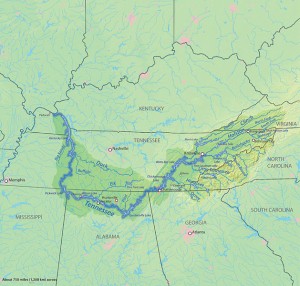… Target for the Union
The editors at The New-York Times have been discussing war strategy with a top man in the Union military, who does not agree with the “On to Richmond” sentiment. This authority believes that a force of 50,000 could defend Washington, D.C. If the rest of the Union troops along the Potomac marched west, a force of 300,000 could capture Nashville and then advance to Northeastern Alabama. The South would be divided. The North could deal with each Confederate army in detail.
From The New-York Times February 1, 1862:
An Important Strategical Plan.
An eminent military authority of this country, has recently prepared some carefully considered strategical views of the campaign, which have been laid before members of Congress, and, we believe, also before the War Department. This gentleman, in opposition to the received opinion, takes the ground, not only that no “Advance from Washington” is intended; but that none ought to be made, if it were practicable. The only results, he states, of Gen. McCELLAN’s forcing the rebels from their intrenchmenls, would be the occupation of Richmond — a barren and unimportant triumph — and the retreat of the Confederate forces by various roads to the South and Southwest; they at the same time, destroying bridges and railroads behind them and sweeping the country clear of forage and supplies. All that the South would lose by the retreat would be the ground of Virginia, while our armies could not pursue the retreating enemy. Their military power would be unimpraired, and they could soon collect a new army from the heart of their territory. Washington, therefore, he considers the worst feasible base of military operations against the South. “The true military principle,” he says, ” requires that a base of operations be selected as near as possible to the heart of the enemy’s country, and from which the lines of movements upon the decisive points shall be as short as possible.” …
This strategical position our authority (a very high one) thinks must strike every military man as the only one which promises success and a speedy close of the campaign. To secure it, he advises at once withdrawing the greater part of the army before Washington, leaving say a garrison of 50,000 men in the intrenchments and on the river, and at once throwing 150,000 drilled and disciplined troops into Kentucky to unite with the armies of Gen. HALLECK and Gen. BUELL for a march upon Nashville. We should then have 300,000 men rapidly advancing on Nashville and North Alabama. Such a force would be irresistible, and Mississippi. Louisiana and Alabama would at once fall into our hands. …
With this plan our authority believes that the rebellion could in effect be broken down in two months, and the turning point in the military campaign be reached. From any “forward movement” from Washington he has no hopes of any decisive result. If Gen. McCLELLAN is forced into it by popular impatience, he believes the effects will be either unimportant or disastrous. The battle which shall put down the rebellion,” he forcibly says, ” is to be fought in the West.” …
We are happy that these views — the results of a long military experience and much study n the science of strategy — coincide with the plan of campaign which this journal has always urged. Such a plan seems peculiarly to suit the present unfortunate state of the roads and the unfavorable weather we are likely to meet with. It is exceedingly doubtful whether heavy artillery — such as would be necessary in the advance from the Potomac — can be dragged through the horrible roads in Virginia before April. In Kentucky, on the other hand, and Tennessee, much of the advance can be made by rivers — the Tennessee and Cumberland; and the roads, according to all accounts, do not seem such a bottomless pit of mire and slime as in the moist climate near the coast. There, too, we have no long-fortified fortifications to assail — for Manassas may be a second Sebastopol now — and the strong positions of Columbus and Bowling Green can be turned. The rebels, in dispatching their two best Generals to Kentucky, evidently feel that the theatre of the war has changed. Shall we be less slow to see it? It must be remembered also by our military leaders, that we have not an unlimited time to wait for a slowly-developing plan of campaign. There are political and sanitary questiions affecting this campaign, as well as military.
The constantly-threatening danger of the recognition of the Confederacy by foreign powers, and the interruption of the blockade, are conditions of the problem; and, furthermore, the malaria of the coasts of the Carolinas and Louisiana.
We do not speak of the fearful expense of the War; but Europe and the Southern fevers leave us but a short time in which to do our vast work. We must strike soon, if we ever mean to strike home. Any plan which seems to promise a speedier conclusion of the campaign, certainly deserves the careful consideration of the War Department and the Commander-in-Chief.
Seven Score and Ten has an excellent post about the importance of the Union controlling the Cumberland and Tennessee rivers. As The Times editors point out those rivers are like a highway into the South and a way to divide it.
The map of the Tennessee is licensed by Creative Commons

